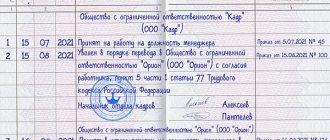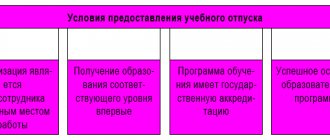How to properly fire an employee who has not passed the test?
Dismissal during the probationary period is possible on personal initiative or at the request of the employer. According to the requirements of the Labor Code of the Russian Federation, if management decides to part with an employee, then it is obliged to notify him at least 3 days in advance by issuing a written notice and allowing him to read it against signature.
Under what article can you dismiss an employee who has not passed the IP test? The procedure for severing labor relations, that is, dismissal, is regulated by Art. 71 Labor Code of the Russian Federation.
Rules for dismissing an employee:
- mandatory written warning;
- drawing up a report on violations during the probationary period;
- issuing a dismissal order;
- timely calculation and issuance of a completed work book.
Even at the stage of receiving a written warning, the employee must be informed of the true reason for the employer’s decision. This reason can only be a systematic failure to fulfill one’s duties or their poor performance with documentary evidence. It is not necessary to notify the union of dismissal.
During the probationary period, it is better to draw up an individual task plan for the employee and record their implementation in a specially kept journal. Such a plan is approved by the company’s management and can serve as documentary evidence of failure to complete the probationary period.
Watch a video on how to fire an employee for failing to complete the probationary period:
Who makes the decision?
During the probationary period, the final decision to dismiss an employee who fails the test is made by his line manager, but it is formed, as a rule, on the basis of collected feedback from colleagues working closely with the new employee.
Thus, the decision may be influenced by: HR department employees supervising the probationary period, line colleagues, project team members, department head, employee’s subordinates, etc.
A separate category includes the process of dismissal during the probationary period of the general director. In this case, the decision is made by the board of directors, the owner of the company, the managing partner or another body with the necessary rights.
Can a person be fired during his probation?
The reason for the severance of the labor relationship may be not only problems with passing the test, but also any of the grounds specified in Art. 81 of the Labor Code of the Russian Federation (for example, liquidation of an employer, staff reduction and much more). Grounds for termination of cooperation before the expiration of the IP:
- failure to complete the probationary period;
- inadequacy for the position held;
- change of owner in the company;
- bankruptcy of the employer;
- staff reduction;
- absenteeism, showing up at work drunk;
- theft, embezzlement, damage to property;
- violation of labor protection;
- refusal to move to another region with the employer;
- provision of false documents during employment, etc.
An employee who is undergoing a probationary period is subject to all labor legislation requirements. He is obliged to comply with labor discipline, work hours and other duties.
The work book does not record any entries about the probationary period. But unlike other employees, the subject has one more reason for dismissal: he may not pass the test period that the employer has set for him (what is the possible length of the probationary period?).
Test period
The probationary period in general should be no more than 3 months (Part 5 of Article 70 of the Labor Code of the Russian Federation). And when concluding an employment contract for a period of 2 to 6 months, the trial cannot exceed 2 weeks (Part 6 of Article 70 of the Labor Code of the Russian Federation).
An extended probationary period may be established for heads of organizations and their deputies, chief accountants and their deputies, heads of branches, representative offices or other separate structural divisions of organizations. For such employees, the probationary period can be up to 6 months.
Reasons and confirmation
The fact of poor performance of one’s job duties must be proven and properly documented. Otherwise, failure to complete the probationary period can be challenged. If the employer believes that there is no point in continuing further cooperation with the employee, then he is obliged to draw up an appropriate act of violations or collect other evidence of his guilt (memos from his boss, written complaints from clients, etc.).
A violation during the probationary period is issued:
- drawing up an act in the presence of several witnesses;
- memos from the supervisor of the subject;
- IP control logs;
- written explanations from the employee about each problem at work.
A separate act is drawn up for each violation. The document may indicate, for example, that the person undergoing a probationary period fails to deliver work on time or systematically fails to cope with the responsibilities assigned to him.
In addition, materials bringing the subject to disciplinary liability (explanatory note, order, acts) can serve as confirmation of problems during IP. If an employee refuses to accept the statement of violations and sign, then a statement of refusal is drawn up. All these documents are very important in case the subject decides to appeal his dismissal.
If the conflict cannot be resolved and the employee continues to perform his or her job poorly, a dismissal order is issued.
Notifying an employee if they fail the test
If the subject has not passed the test, the employee can be warned that there will be no further cooperation using a written notice drawn up in any form. There is no single form for notification of termination of an employment contract during a test due to failure to pass it, therefore, each company prepares a notification according to its own standard template.
The notice must contain:
- name, details);
- title of the document (notice);
- reference to the employment contract (number, date of conclusion);
- reasons for dismissal (with reference to the Labor Code of the Russian Federation);
- number, date of notification;
- position, full name of the subject;
- signature and seal of the manager.
The notice indicates the employee’s full name, his position, as well as the reason for the upcoming dismissal. The document must make reference to the article of the Labor Code of the Russian Federation on the basis of which the employee is dismissed. But the main thing from the notification should be clear on what basis the conclusions about the subject’s professional incompetence were made (for example, you can provide a link to the memo from the immediate supervisor, a journal for passing an IP or an act on the release of a defect).
The document is drawn up at the company secretariat and signed by its director. Notice must be provided for review and signature at least three days before the upcoming date of termination of the employment relationship.
The document is delivered in person or sent by registered mail to your home address. The notice period (3 days before dismissal) includes non-working days. If an employer fires an employee without notice, this will be considered a violation of labor laws, even if the employee has worked for the company for less than a week.
Many employers believe that a dismissal order is a notice (warning) of the termination of the employment relationship. However, it is not. It is necessary, even before issuing the order, to warn the employee in writing that he has not completed the probationary period and will be fired.
What is needed to establish a probationary period?
We talked about the meaning of the probationary period and its duration in the material.
The test is introduced on the basis of the following documents:
- employment contract;
- PVTR;
- job description;
- work plan for the introductory period (list of tasks and format for reporting on their implementation).
It is important for the employer to familiarize the new employee with job responsibilities and rules of conduct, violation of which may result in an unsatisfactory inspection result (Part 2 of Article 22, Article 56, Part 1 of Article 67, Part 1 of Article 189 of the Labor Code of the Russian Federation).
Management has the right to dismiss an employee for failing to pass the entrance test under Part 1 of Art. 71 Labor Code of the Russian Federation. But the employee can argue with such a decision in court. Therefore, it is important to prove the fact of unsatisfactory completion of the probationary period. Read about establishing a test when transferring to another position here.
Reasons for failure to pass the IP
During the probationary period, the company and the employee make decisions for themselves whether to continue working or not. If the answer for the employer is negative, then it may be due to the low quality of the subject’s work, ignorance of the company’s labor discipline, customer dissatisfaction and many other reasons.
The easiest way to determine the reason for terminating the contract is if a log of the passage of the IP is kept or memos are constantly drawn up addressed to management, due to poor quality of work.
How to place an order?
An order to dismiss an employee can be drawn up using the unified form No. T-8. It indicates the reason for dismissal and the date. The employee must be familiarized with this document against signature, and if he refuses to sign, a statement of refusal must be drawn up.
To correctly compose an order you must:
- indicate the name and details of the company;
- personal data, employee position;
- indicate the number of the employment contract, the date of conclusion (if drawn up in writing);
- enter the order number, the date of its preparation;
- clearly indicate the reason for dismissal with reference to the Labor Code of the Russian Federation;
- sign and seal the company.
The date of drawing up the document should not be later than the last day of the test (these are the requirements of the Labor Code of the Russian Federation). Since 2015, the presence of a seal in the dismissal order is not mandatory for companies created in the form of a joint stock company or LLC. An order cannot be issued if the employee has asked to take sick leave. It is necessary to wait until the sick leave is closed and first hand in the notice of dismissal, and then the management order.
Calculation procedure
If you are dismissed during probation, you will be paid the accrued earnings during your work, as well as compensation for vacation (if applicable). Considering the short period of work in the company (by law, the probationary period should not exceed 3-6 months), the amount of vacation pay is minimal. If the work in the company was less than 15 days, then such payment is not due at all.
The costs of paying sick leave may also be reimbursed. If the reason for dismissal during the probation period was a reduction in staff or the closure of the company, then the dismissed person may also be paid severance pay in the amount of average monthly earnings.
If the employment relationship is terminated due to failure of the test, the employee is not entitled to severance pay. All money for laid-off employees is paid on their last day of work, just like regular employees.
Who is not eligible for the test?
Despite the fact that during the probationary period the employee is subject to the provisions of labor legislation, collective agreements, agreements, and local regulations of the employer, it is not always possible to establish a probationary period. Thus, a test is not established, in particular, for (Part 4 of Article 70 of the Labor Code of the Russian Federation):
- pregnant women and women with children under 1.5 years of age;
- persons under the age of 18;
- persons who have received secondary vocational or higher education in state-accredited educational programs and who first enter work in their specialty within 1 year from the date of receipt of the relevant education;
- persons invited to work as a transfer from another employer;
- persons concluding an employment contract for a period of up to 2 months.
Handing over a work book
The final part of the dismissal procedure is filling out the work book. Entries in this document must be numbered and made strictly in their own sections. The reasons for termination of the contract must be indicated (for example, the probationary period has not been completed with reference to Article 71 of the Labor Code of the Russian Federation), details of the order, the company’s seal, the signature of the personnel officer and the employee himself are required.
An entry in the employment record upon dismissal can be formulated not only as a failure to pass the IP (“dismissed due to an unsatisfactory test result”), but also as a dismissal of one’s own free will, by agreement of the parties, or for another reason. The wording specified in the work book must completely coincide with that specified in the director’s order.
The work record book is handed over to the dismissed person against his signature in the personal card and in the book recording the movement of work records and inserts in them. If the employee is absent on the day of dismissal, he is sent a notification by registered mail about the need to collect the work and the money due. Thus, the employer relieves himself of responsibility for failure to issue a work permit, which threatens him with fines and problems with inspection authorities.
Dismissal during a probationary period: step-by-step procedure
If the probationary period is established in compliance with the law (the test is specified in the employment contract, the employee is familiarized with the duties and given a work plan), but is not completed, dismissal is carried out as follows.
Step 1: Employer documents violations
The law does not provide a specific list of documents indicating that the employee cannot cope with tasks. The justification for dismissal can be confirmed by:
- an order for disciplinary action issued in compliance with the established procedure;
- acts or memos recording non-fulfillment or improper performance of duties (failure to comply with standards, violation of discipline, admission of marriage);
- characteristics of the immediate supervisor;
- complaints from clients, customers, visitors;
- reports and explanatory notes from the employee himself, incl. about the reasons for non-fulfillment of the work plan.
Step 2. The employer notifies the employee of failure to pass the test and dismissal
Dismissal during the trial period does not require the opinion of the trade union or informing other bodies. It is only important to notify the employee himself no later than 3 calendar days before the end of the test (Part 1 of Article 71 of the Labor Code of the Russian Federation).
In order to avoid the dismissal being considered illegal, we recommend counting 3 days without taking into account the day the employee receives the notice, or notifying in advance, “with reserve”.
Note! The probationary period does not include periods of absence of a subordinate from the workplace, for example, due to sick leave or vacation (Part 7 of Article 70 of the Labor Code of the Russian Federation).
Step 3. The employer issues a dismissal order
For such a dismissal, the standard T-8 order form is suitable, subject to some subtleties:
- the date of dismissal should not be later than the last day of the probationary period (Part 3 of Article 71 of the Labor Code of the Russian Federation);
- acceptable wording of the grounds for termination (termination) of an employment contract: “Unsatisfactory test result, part one of Article 71 of the Labor Code of the Russian Federation”;
- in the column “Base (document, number, date)” the clause of the employment contract establishing a test for hiring and the details of notifying the employee of the upcoming dismissal are indicated.
The employee is familiarized with the order against signature or a note is made about refusal to familiarize itself (Part 2 of Article 84.1 of the Labor Code of the Russian Federation).
How to draw up an order for the dismissal of a group of employees - read here.
Step 4. The employer enters information into the work book and information about work activities
The entry on dismissal due to failure to pass the test in the work book looks like this:
Data on dismissal in the SZV-TD form are submitted to the Pension Fund no later than the working day following the day the dismissal order is issued.
Employer's liability
If during the probationary period an employee is fired without explaining the reasons and drawing up a report of violations, then he has the right to appeal the employer’s actions in court within a month. After going to court, you can be reinstated at work or change the wording of your dismissal and demand compensation for moral damages.
Dismissal may be considered illegal if:
- there is no mention of IP in the employment contract;
- the company issued a hiring order without specifying the IP;
- the employee was fired while on sick leave or maternity leave;
- the test is established for those categories of workers for whom it is not provided;
- the employer did not justify in any way the failure to pass the IP.
For legal dismissal, there must be an order for employment with an IP and confirmation of failure to pass the test - acts, complaints, memos, etc. (read about whether it is possible to work for an IP without a contract here). All this can easily be presented in court if the matter comes to a legal dispute.
Employers are subject to administrative liability for violation of labor and labor protection legislation (Article 5.27 of the Administrative Code), including illegal dismissal. Officials face a fine of 1-5 thousand rubles, and for individual entrepreneurs they also face administrative suspension of activities for up to 90 days. The fine for companies can be up to 50 thousand rubles.
Employer risks
Even if everything is done as competently as possible, there is always a risk that the offended employee will go to court to challenge the reasons for not completing the probationary period. In order to be confident in a positive outcome of the case, the employer must reduce all possible risks to a minimum.
Common mistakes
- untimely notice of dismissal;
- the absence in the employment contract of a stated clause on assigning a probationary period to the employee;
- insufficient justification of the reasons;
- lack of familiarization with the job description at the time of signing the employment contract.
Arbitrage practice
Labor legislation does not regulate a specific list of documents required to justify dismissal due to the employee’s failure to complete the probationary period, as a result of which each case is considered individually to determine the sufficiency of the evidence presented.
A court that finds such a dismissal unlawful may oblige the company to reinstate the employee to his previous position and pay compensation:
- Wages for the period of forced work downtime;
- Compensation for legal costs;
- Compensation for moral damage.
Is it possible to terminate the relationship after the end of IP?
The employer has the right to terminate the relationship with the subject at any time before the expiration of his inspection period. To do this, there is no need to request the opinion of the trade union; management’s initiative is sufficient. However, if this period has already expired, then it is impossible to dismiss him on the basis of failure to pass the test.
It is considered that if the deadline has passed and the employer does not make any claims against the employee, then the hiring test has already been passed. Dismissal in this case is possible on other grounds, for example, by agreement of the parties, in connection with violation of labor discipline, etc.
A probationary period is now assigned in many companies, so it is very important to know how to correctly formalize it in a fixed-term and permanent employment contract. And you can find all the necessary information about this on our portal.
Causes
There are three main reasons why an employee may “fail” the probationary period:
- Inconsistency between the employee’s qualifications and the functionality performed. The most common reason, the roots of which lie in an incorrect assessment of the candidate during an interview.
- “Didn’t fit in” with the team. One of the most “slippery” reasons because it is the most difficult to measure. Sometimes it happens that an employee does not fit into the existing corporate culture of the company, does not support certain moral values, behaves differently from what is customary in this particular organization, etc.
- Violation of labor discipline. According to statistics, one of the rarest reasons for dismissals is during the probationary period. As a rule, adequate employees do not allow themselves to commit gross violations of discipline, and most often such a reason “covers up” the true one - professional incompetence, which is simply much more difficult to prove in fact.
Each of the listed reasons must be documented and justified.
In an ideal situation, in order to determine whether an employee successfully passes the probationary period or not, it is necessary to determine the criteria for success at the time of signing the employment contract.
In Russian companies, KPIs (key performance parameters) are quite rarely formed “at the entrance” to the company, and yet they could serve as excellent assessment tools.








